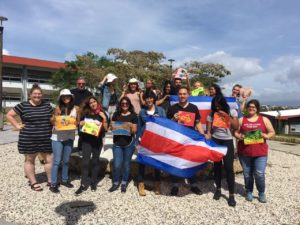Do’s and Don’ts of Study Abroad in Costa Rica

As I finish up my semester here in Costa Rica, I’ve been taking more and more time to reflect upon the culture that I’ve integrated myself in. Costa Rica and studying abroad have their quirks, but you stop noticing them after a while. These differences became starker to me when my mother visited and pointed them all out, whereas they had become part of my daily routine. The purpose of this article is to explore some of those cultural differences and to share advice for how to prepare to study abroad here. Below, I share a list of Do’s and Don’ts of study abroad in Costa Rica that I have accummulated throughout my time here.
Do: Bring rain gear
Costa Rica is in the tropics, so think Florida weather. That means that it rains usually at least once a day during rainy season (May-November), most often starting around 2pm. Bring an umbrella, rainboots, and a good raincoat for your semester, and always have one protective device on you at all times. One of my worst experiences here was being caught walking home in the rain without an umbrella – I walked through the door dripping wet.
Do: Bring nice clothes
As someone who typically wears leggings and a t-shirt to class in the US, I was surprised at the degree to which students at UNA dress up for class. It’s typical to see girls in nice outfits with heels, jeans, and makeup on at an 8am lecture here. I’m not saying to go full fancy, but definitely bring some nicer pieces for occasions like having to give a class presentation.
Do: Buy expensive stuff before hand
Certain things in Costa Rica cost more than in the US. The three big ones are school supplies, clothing, and sunscreen. For these three items, bring it all with you! Sunscreen can cost up to 20 dollars a bottle, which is something you’re definitely not going to want to cough up at really any point in your semester. Clothes also come at a much higher cost, so don’t pack with a plan to buy stuff here.
Do: Stay connected with family
Going abroad is a great way to disconnect from back home, but it’s never good to be too disconnected. Once you have a regular schedule, set up a specific time to call home and talk to your parents, who are definitely dying to hear from you. Also, send check-in texts to your friends. It might seem like you have to just focus on the people with you abroad, but your friends back home will absolutely appreciate updates on how you’re doing. There’s wifi at your host home, so during downtime you can always call home.
Don’t: Overwhelm yourself with classes
Be strategic with your course load. Yes, this is STUDY abroad, but you still want to have time to enjoy yourself. I would caution against taking too many literature or biology courses, as these typically have the heaviest course load. The most important thing however is that you truly enjoy every class you enroll in, so that the work is actually fun.
Don’t: Over pack
So many people will warn you about this, and you’ll still do it. Trust me, I did it too. But really, don’t over pack. Everyone has about 5-7 outfits that they wear repeatedly, so bring those plus clothes for class and for excursions. You really don’t need that much. Also, it’s important to remember you have access to laundry and the ability to re-wear clothes in any combination your heart desires.
Don’t: Flush anything down the toilet
Costa Rica’s plumbing system is unique in that almost nothing can be flushed down the toilet. Be prepared to throw your paper in a wastebasket in the stall, starting from when you land in the airport. Even the fancy places have this rule, so don’t think just because you’re at a nice hotel it means you can mess up the sewage system.
Don’t: Go anywhere without good directions
Another unique thing about Costa Rica I wish I had known before I came is their ‘unique’ system of giving directions. Although there are street names, no one knows them, and there are no street numbers either. Thus, directions are given based on landmarks and meters. For example, you would say that a café is 150 meters south of UNA by the copy shop. This can get very confusing very quickly. Make sure that before you depart to any destination, you actually know exactly where you’re going — either by having someone drop a pin in your google maps or through WhatsApp.
Don’t: Bring coins to the soccer stadium
A final little quirky tip! If you go to a soccer game in Costa Rica, leave your coins at home or they’ll get confiscated. This is due to rowdy fans who like to throw heavy coins at players or refs they disagree with. Keep your change safe and out of the stadium!
Studying abroad in Costa Rica is an incredible experience. The nature is beautiful, the food is great, and the people are wonderful! In my experience, it’s important to take advantage of every opportunity to further immerse yourself in the culture and experience new things. Costa Rica has a unique culture and flavor, in which spending a semester has been awesome. The do’s and don’ts in this list represent a semester full of fond memories and learning experiences.
Gabriela Rossner is a student at George Washington University and studied abroad with IFSA at Universidad Nacional de Costa Rica in Heredia, Costa Rica in fall 2018.
